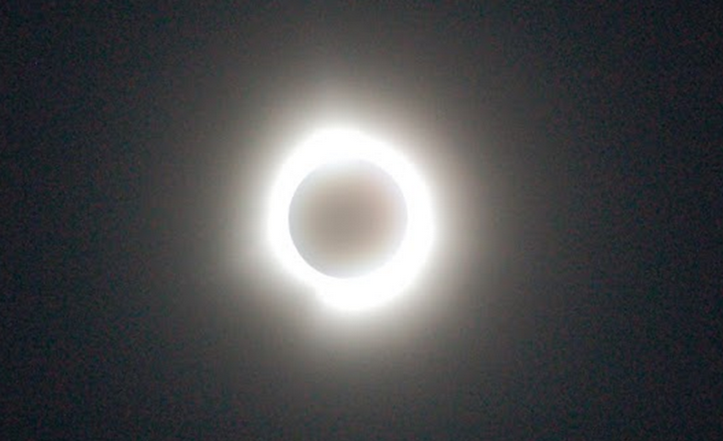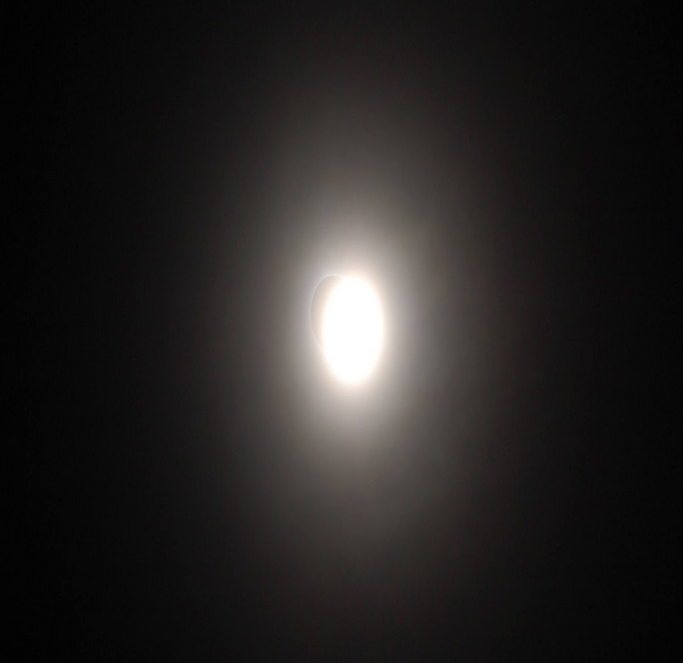Jonah's Eclipse
OT Lesson: Genesis 1:14-19 (CEB)
God said, “Let there be lights in the dome of the sky to separate the day from the night. They will mark events, sacred seasons, days, and years. They will be lights in the dome of the sky to shine on the earth.”
And that’s what happened. God made the stars and two great lights: the larger light to rule over the day and the smaller light to rule over the night. God put them in the dome of the sky to shine on the earth, to rule over the day and over the night, and to separate the light from the darkness. God saw how good it was.
There was evening and there was morning: the fourth day.
NT Lesson: Matthew 12:38-42 (NRSV)
Then some of the scribes and Pharisees said to Him, ‘Teacher, we wish to see a sign from You.’ But He answered them, “An evil and adulterous generation asks for a sign, but no sign will be given to it except the sign of the prophet Jonah. For just as Jonah was for three days and three nights in the belly of the sea monster, so for three days and three nights the Son of Man will be in the heart of the earth. The people of Nineveh will rise up at the judgement with this generation and condemn it, because they repented at the proclamation of Jonah, and see, something greater than Jonah is here! The queen of the South will rise up at the judgement with this generation and condemn it, because she came from the ends of the earth to listen to the wisdom of Solomon, and see, something greater than Solomon is here!”
Sermon
Introduction
Good morning! As you all know, today is an important day for us. After the service, we will gather for our communal luncheon while having the annual meeting. I will head over to Kroger to pick up some fried chicken for us, and I encourage you to review the annual meeting packet in the meantime. Also, I’d like to announce our new annual photo contest; this year’s theme will focus on flowers. You can email me any flower photos which you took.
Now, how have you been? I was not here last Sunday as I was on my study leave. Unfortunately, I ended up working from Monday to Thursday, which was not ideal nor my original plan. Then, I travelled to Chicago to visit Hannah’s family. While there, I also stopped by McCormick Theological Seminary on Friday, and spent Sunday at my home church in Naperville. I started my drive back late Sunday afternoon, which was a day before the solar eclipse. Normally, it is about a three-hour drive from Chicago to Lebanon, but last Sunday, it took over six hours due to incredibly heavy traffic. I had never before seen such congestion on I-65, with cars lined up as far as the eye could see. To complicate matters, we were hit by torrential rains and multiple accidents—not that I had accidents but there were very many accidents on the road. Nonetheless, I made it home safely, albeit after enduring over five plus hours of non-stop ‘Baby Shark’ from Samuel’s tablet. By the way, did any of you catch the solar eclipse last Monday?
Eclipse Is Not So Rare
Watching the total solar eclipse was a truly awe-inspiring, magnificent experience. The alignment of these two celestial bodies was simply breathtaking. It is fascinating to consider that the sun is four hundred times larger than the moon, yet it is also four hundred times farther from Earth than the moon. This makes the sun and moon appear almost the same size from our perspective here on Earth.
Now that the eclipse has passed, you might be wondering when the next total eclipse will occur in Indiana. According to WHAS11, the next one in Kentucky and Indiana is expected in the year 2153. Just wait another 129 years, and you will be able to witness it again right here. But what about the past? According to the Indy Star, the last total solar eclipse visible in Lebanon occurred in 1205, or 819 years ago. In Carmel, it was in 831, or 1,193 years ago. We truly had a once-in-a-lifetime opportunity to witness this phenomenon in our own backyard.
However, let me clarify something: solar eclipses are not as rare as you might think. Essentially, a solar eclipse is the shadow of the moon. With the sun and the moon both present in space, there is always a solar eclipse happening somewhere in the universe. NASA states that a solar eclipse occurs every eighteen months somewhere on Earth. The next predicted solar eclipses include dates like October 2nd, 2024; March 28th, 2025; September 21st, 2025; February 17th, 2026; and August 12th, 2026. For instance, a total solar eclipse passed over Kentucky in 2017. I was in southern Indiana at the time and witnessed a partial eclipse right at our church. So, solar eclipses are indeed frequent cosmic events.
Why don’t we see them more often, then? First, more than 70% of eclipses occur over the ocean, which covers 70% of the Earth’s surface. Furthermore, the path of totality is quite narrow. Unless you are directly on this path, even a 95% eclipse will barely be noticeable, appearing only slightly darker than usual. If you tried to observe the sun at this coverage with your bare eyes which I hope you did not since it may damage your eyes, you wouldn’t see any difference without prior knowledge. At about 97% coverage, I glanced at the sun without protection, and it still appeared as a bright, round ball. However, with protective glasses, the sun was reduced to a very thin, crescent shape. This just proves how incredibly powerful and bright the sun is. Thus, without advance knowledge and the necessary protective eyewear, even a 95% eclipse can go unnoticed. This is why, despite their frequency, solar eclipses seem rare to us and were even rarer in historical times.
Eclipse and Columbus
Eclipses are now nothing more than exotic and magnificent spectacles, largely because we understand their nature and can predict them with great accuracy. However, this was not always the case. For example during the last dynasty in Korea, there was a government bureau dedicated to predicting eclipses. While the king and nobles were well-informed about these events, the common people were not. During an eclipse, the king would perform a ceremonial ritual: he dressed in special attire, built an altar, and publicly cried out to the heavens to restore the sun. Miraculously, to the common people, the sun would reappear within minutes. In their eyes, the king had foreseen the disaster and, through his prayers, had prompted a divine response. “Wow, when the king prays, God listens! He is indeed the king!”
A more famous historical account involves Christopher Columbus during his time stranded on what is now Jamaica. Reliant on the indigenous people for provisions, tensions rose as Columbus continued to demand supplies without offering anything in return. Aware that a total lunar eclipse was imminent, Columbus summoned the indigenous leaders and declared that the Christian God was extremely displeased with their lack of generosity. He warned them that God would demonstrate his anger by taking away the moon. On the night of February 29th, 1504, when the lunar eclipse occurred, the terrified leaders agreed to meet all of Columbus’s demands.
To the people of ancient times, lacking scientific understanding, both solar and lunar eclipses were terrifying phenomena. According to the scriptures, such as today’s Old Testament reading, God placed celestial bodies precisely to mark events, sacred times, days, and years. The most famous example is the star that guided the wise men to the birth of Jesus. Let us remember, then, that to our ancestors, eclipses were awe-inspiring and frightening signs from the heavens.
Jonah’s Story
In today’s New Testament lesson, Jesus references the prophet Jonah, who is quite unique among the prophets, and not necessarily in a commendable way. Unlike other prophets known for their faith, zeal, and obedience, Jonah exhibits none of these virtues. Yet, he is the only prophet with whom Jesus explicitly compares Himself. Imagine this: it is as if God asked Jonah to go to Madison, Wisconsin, and instead, he fled to Miami, Florida. While other prophets feared God, Jonah openly challenged and even argued with God just like a toddler throwing a tantrum at a store. In many respects, Jonah is a standout character.
When I first read the book of Jonah, it puzzled me. How did you feel about it? I have met many people who struggle particularly with the idea of the big fish. Personally, that part did not bother me—I believe in God’s omnipotence, and that He can certainly orchestrate such events. However, what did challenge my understanding was chapter 3, where the king, nobles, and people of Nineveh all repent and cry out to the Lord.
To put it in contemporary terms, imagine a shaman from Uganda, for example, arriving in Washington, D.C., proclaiming in front of the Lincoln Memorial for half day that Americans must repent or face doom. Then, imagine if the very next day, President Biden, Vice President Harris, all 50 senators, all 435 House members, every secretary of government departments, and every governor were to tear their clothes and cry out in repentance on the streets, all because of just one word from the Ugandan shaman. If you read about something like this in the Lebanon Reporter, would you believe it? Would you find it plausible? I certainly would be sceptical, perhaps dismissing it as an elaborate April Fool’s joke. This is essentially what we encounter in Jonah chapter 3. It seems implausible, especially when considering what we read in the book of Exodus how Pharaoh remained unrepentant despite the numerous miracles and signs performed through Moses in Egypt.
Then, I came across an interesting piece of information. As astronomers can predict future eclipses, they can also calculate when and where they occurred in the past. Some astronomers have done this and discovered evidence of a total solar eclipse occurring near the ancient city of Nineveh around the time Jonah is believed to have been active. This casts Jonah’s story in a new light: Jonah spent a day in the city, proclaiming doom and destruction. Initially, no one paid any attention to this strange, foreign prophet from an unknown land. However, when a total solar eclipse darkened the sky shortly after his proclamation, panic ensued. From the king down to the slaves, everyone was struck with fear, recalling the dire warnings Jonah had shouted. In their terror, triggered by the eclipse, they repented sincerely.
Understanding this astronomical event helps make sense of the dramatic and sudden repentance in Nineveh. Now the story of Jonah is plausible. It seems the timing of Jonah’s message and the solar eclipse aligned perfectly to produce this effect. It is particularly relevant to discuss now since we just have experienced a total solar eclipse ourselves last Monday while our memory is fresh.
Jonah’s Eclipse
Continuing with Jonah’s story, after delivering his message, Jonah went outside the city, with popcorn in hand, eagerly anticipating the destruction of Nineveh. But, contrary to his expectations, God spared the city. God’s mercy extended even to those Jonah deemed sinners or evil. Understandably, Jonah was frustrated. Imagine heading to GQT Lebanon 7, ready to watch an action-packed movie, only to find yourself sitting through endless commercials for over two hours. That irritation you’d feel mirrors Jonah’s reaction. He was extremely upset and openly expressed his anger towards God that he wants to see the death of the people. If any of the Ninevites had witnessed Jonah’s reaction, how would they have felt?
Let’s consider the scientific aspects of a solar eclipse. As you know, the sun emits its own light, whereas the moon simply reflects sunlight back to Earth. A full moon is incredibly bright at night. However, during a solar eclipse, the moon obscures the sunlight, casting a shadow and plunging us into darkness. This is not the moon’s primary role, and thus we call this phenomenon an eclipse. Relating this back to Jonah, his anger effectively ‘eclipsed’ the love of God. As a prophet, his primary role was to convey God’s love and guide people towards repentance. Instead, his anger and desire for the destruction of countless individuals obscured the divine love he was supposed to reflect. The thing was that his anger was caused by his sense of justice. He believed that sinners must be punished and that is the justice.
Now, let us reflect on ourselves. As Christians, our primary mission is to reflect the light of Christ and His love onto others in our community. Much like the moon, I believe we generally do a commendable job. However, we must periodically examine whether we are occasionally ‘eclipsing’ the love of Christ. Even though we are faithful, could our faith sometimes obscure the light of Christ, thereby alienating others from Him? We strive to be pious and holy, but could our piety sometimes cast a shadow over Christ’s love by judging others, thus pushing them further into darkness? Does our faith eclipse God’s love sometimes? Does our piety eclipse the mercy of Christ from time to time? Does our self-righteousness eclipse the gospel of Jesus occasionally?
Conclusion
Friends, we are like the moon in the world. We do not generate our own light, but we are called to reflect the light of Christ and the love of Jesus, not to eclipse them. Our foundational mission as Christians is to bring good news to those in despair and to introduce Jesus Christ, the light of the world, to those living in darkness. We acknowledge our sinful nature and our imperfections, and it is understandable that we might falter sometimes. However, let us strive with all our might to ensure that we do not eclipse the love and mercy of our risen Saviour. Instead, may we continuously shine the light of Jesus Christ onto our families, our friends, and our neighbours. Amen.









Comments
Post a Comment